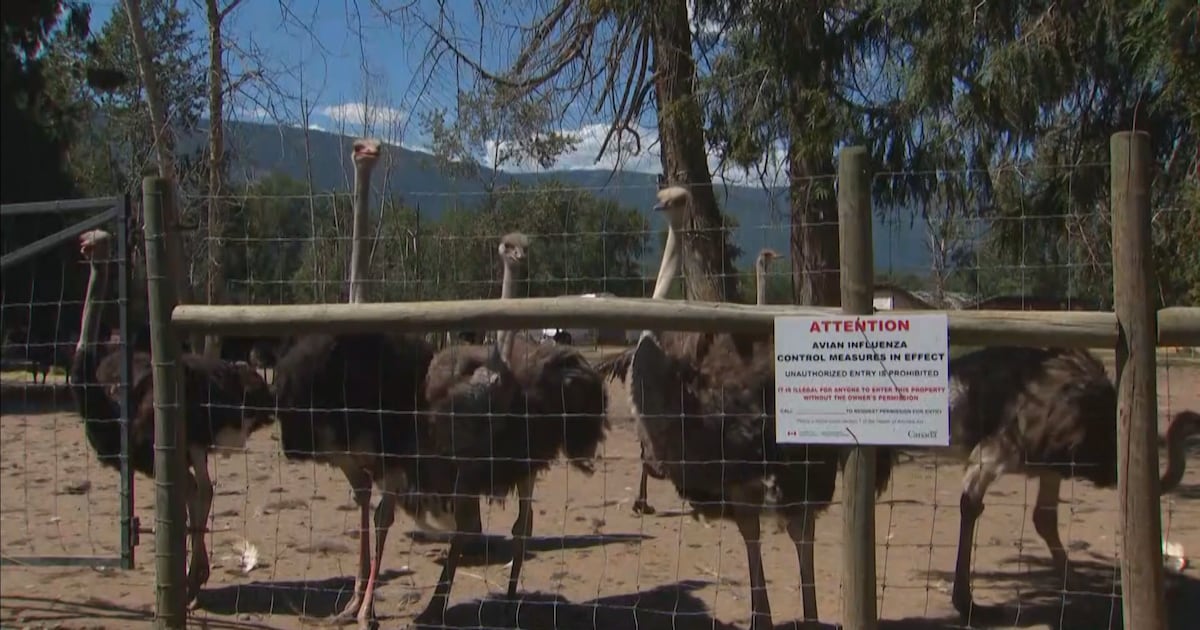Health
Residents Demand Answers as B.C. Ostrich Farm Fights Avian Flu Cull

Residents near the Universal Ostrich Farm (UOF) in Edgewood, British Columbia, are expressing their frustrations as the farm’s owners continue to contest an avian flu cull ordered by the Canadian Food Inspection Agency (CFIA). For the past eight months, neighbours have felt increasingly ignored as they navigate the stress and uncertainty surrounding the situation. The cull was first mandated following positive avian flu tests in December 2022, leading to the death of 69 ostriches, while nearly 400 others survived.
Throughout this ongoing battle, community members have voiced concerns about the health risks posed by the farm. Kelley Soroka, a local resident, stated that the situation has turned the valley into “quite a turmoil.” As protests have drawn attention from across the province, sentiments among locals remain divided, with many expressing a lack of support from their elected officials.
Health Concerns and Community Division
The UOF’s spokesperson, Katie Pasitney, asserts that their remaining flock is healthy. “We have had no illness and no deaths on our farm for 223 days. They are thriving. Our herd of ostriches is a living vault of immunity,” Pasitney told reporters. Despite these claims, nearby farmers like Jim and Millie McFarlane worry about the potential impact on their livestock. As they operate within a secondary quarantine zone, Jim McFarlane questioned whether this situation might affect the market price for their cattle when they are shipped in the fall.
Pasitney countered these concerns, stating, “Linking our fight to protect ostriches with cattle price fluctuations is misleading.” This ongoing tension highlights the community’s anxieties as they grapple with the implications of the cull.
Residents also feel a disconnect with their elected representatives. Scott Anderson, the Conservative MP for Vernon-Lake Country-Monashee, recently issued a statement expressing disappointment in the CFIA’s approach. He criticized their refusal to consider alternative options to mass culling. Anderson noted that he has received mixed feedback from constituents, with some supporting the CFIA’s actions while others oppose them. Despite an initial agreement for an interview with CTV News, Anderson’s office later declined, citing time constraints.
Randy Donselaar, a local resident, expressed his frustration with Anderson’s perceived lack of representation for community concerns. “He is not representing the voice of our community… and I think he’s either blind to that or he doesn’t care,” Donselaar remarked.
Political Dimensions and Public Health Implications
The situation took a political turn when American television personality Dr. Mehmet Oz offered to relocate the ostriches to his ranch in Florida, calling on the Canadian government to intervene. Both Soroka and Donselaar expressed discomfort with an outsider’s involvement, with Soroka stating, “It really bothers me that the Americans are involved.”
As the protests have evolved, many locals believe the issue has shifted from animal welfare to a broader discussion about government overreach. Debra Pion, another long-term resident, commented, “It’s become very political, and the birds are just a non-issue right now.”
Angela Rasmussen, a virologist at the University of Saskatchewan, supports the CFIA’s directive, stating that the offer to move the ostriches to the U.S. undermines critical public health regulations. “There has really been a full-scale attack on American public health practices and policies,” she said, highlighting the importance of maintaining evidence-based responses to potential health threats.
In response to the growing concerns, Pasitney reiterated the farm’s position, stating, “This battle has dragged on for months not because of any ongoing risk to public health or safety.” She emphasized that the CFIA’s refusal to test the birds is impeding progress and that locals should direct their concerns to the agency.
The CFIA maintains that, while the ostriches appear healthy, they could still be carriers of the virus, posing a risk of mutation. In a statement, the agency noted, “It increases the risk of reassortment or mutation of the virus, particularly with birds raised in open pasture where there is ongoing exposure to wildlife.” Following the Federal Appeal Court’s order on August 21, 2023, the CFIA has the authority to cull the herd at any time.
As tensions rise and the fight against the cull continues, residents remain focused on their health and livelihood, eager for clarity and support from their elected officials. The outcome of this situation not only affects the residents of Edgewood but also raises crucial questions about public health policy and animal welfare in the context of avian flu management.
-

 Lifestyle6 days ago
Lifestyle6 days agoChampions Crowned in Local Golf and Baseball Tournaments
-

 Science2 weeks ago
Science2 weeks agoMicrosoft Confirms U.S. Law Overrules Canadian Data Sovereignty
-

 Technology1 week ago
Technology1 week agoDragon Ball: Sparking! Zero Launching on Switch and Switch 2 This November
-

 Education6 days ago
Education6 days agoRed River College Launches New Programs to Address Industry Needs
-

 Technology2 weeks ago
Technology2 weeks agoGoogle Pixel 10 Pro Fold Specs Unveiled Ahead of Launch
-

 Technology2 weeks ago
Technology2 weeks agoWorld of Warcraft Players Buzz Over 19-Quest Bee Challenge
-

 Science1 week ago
Science1 week agoChina’s Wukong Spacesuit Sets New Standard for AI in Space
-

 Science2 weeks ago
Science2 weeks agoXi Labs Innovates with New AI Operating System Set for 2025 Launch
-

 Health1 week ago
Health1 week agoRideau LRT Station Closed Following Fatal Cardiac Incident
-

 Technology2 weeks ago
Technology2 weeks agoNew IDR01 Smart Ring Offers Advanced Sports Tracking for $169
-

 Science2 weeks ago
Science2 weeks agoTech Innovator Amandipp Singh Transforms Hiring for Disabled
-

 Health1 week ago
Health1 week agoB.C. Review Urges Changes in Rare-Disease Drug Funding System
-

 Technology2 weeks ago
Technology2 weeks agoHumanoid Robots Compete in Hilarious Debut Games in Beijing
-

 Technology2 weeks ago
Technology2 weeks agoFuture Entertainment Launches DDoD with Gameplay Trailer Showcase
-

 Science2 weeks ago
Science2 weeks agoNew Precision Approach to Treating Depression Tailors Care to Patients
-

 Technology2 weeks ago
Technology2 weeks agoGlobal Launch of Ragnarok M: Classic Set for September 3, 2025
-

 Lifestyle1 week ago
Lifestyle1 week agoVancouver’s Mini Mini Market Showcases Young Creatives
-

 Technology2 weeks ago
Technology2 weeks agoInnovative 140W GaN Travel Adapter Combines Power and Convenience
-

 Business2 weeks ago
Business2 weeks agoNew Estimates Reveal ChatGPT-5 Energy Use Could Soar
-

 Science2 weeks ago
Science2 weeks agoInfrastructure Overhaul Drives AI Integration at JPMorgan Chase
-

 Top Stories2 weeks ago
Top Stories2 weeks agoSurrey Ends Horse Racing at Fraser Downs for Major Redevelopment
-

 Health2 weeks ago
Health2 weeks agoGiant Boba and Unique Treats Take Center Stage at Ottawa’s Newest Bubble Tea Shop
-

 Business1 week ago
Business1 week agoCanadian Stock Index Rises Slightly Amid Mixed U.S. Markets
-

 Education1 week ago
Education1 week agoParents Demand a Voice in Winnipeg’s Curriculum Changes










